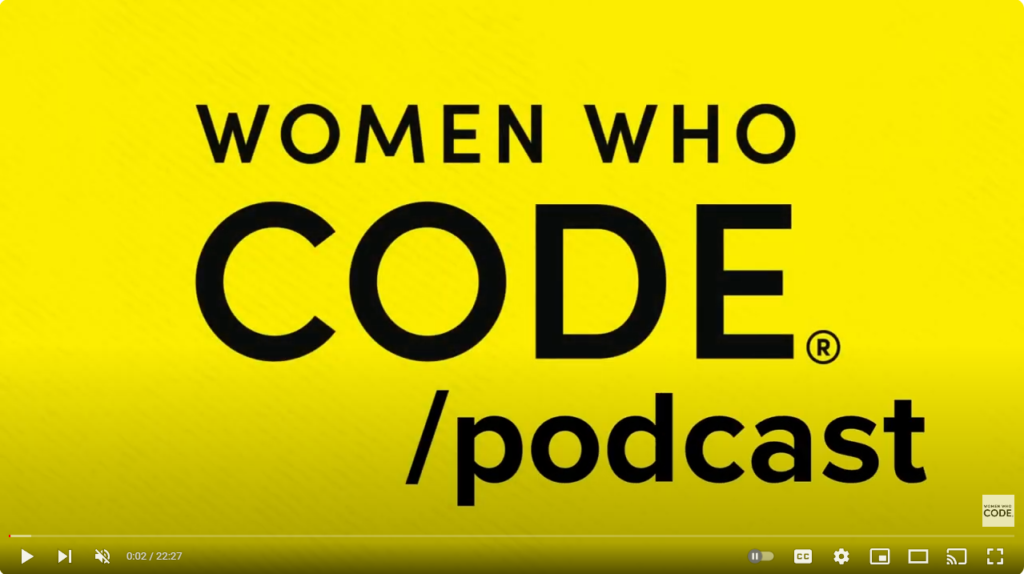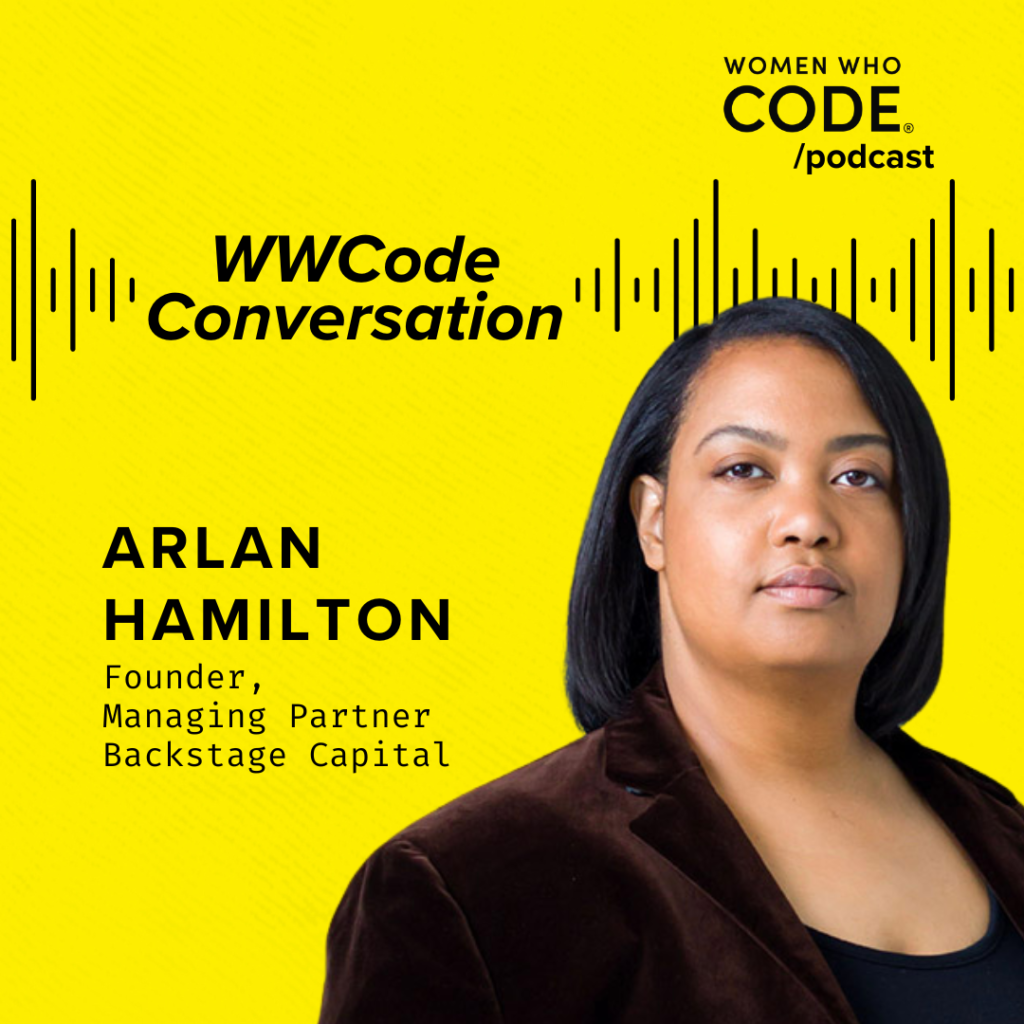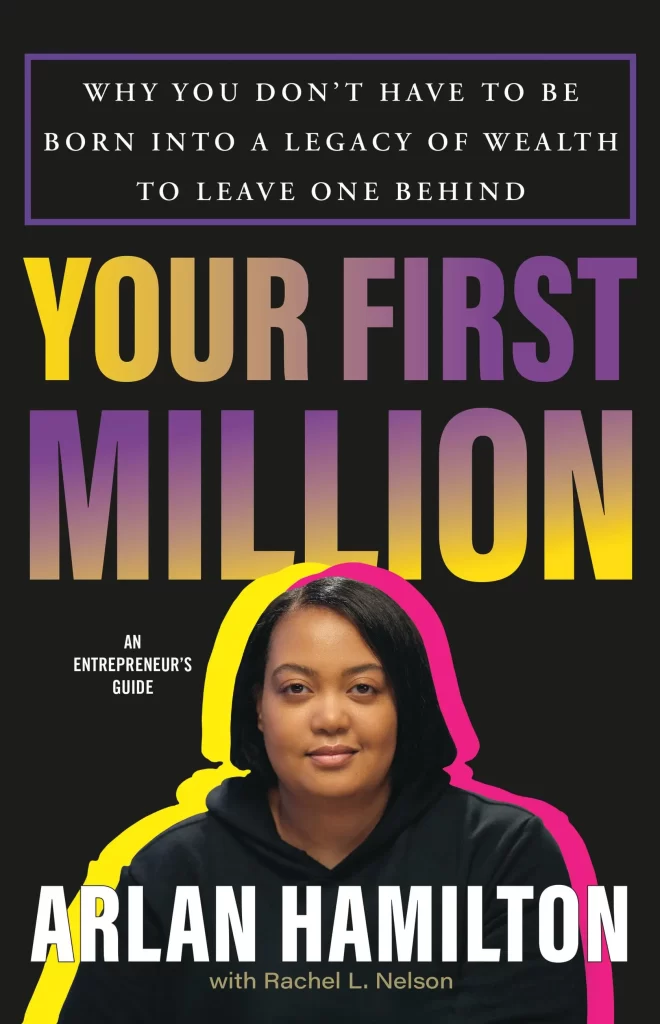WWCode Conversations: Arlan Hamilton, Founder, Managing Partner – Backstage Capital
Written by Arlan Hamilton

iTunes – Spotify – Google – Video – More Episodes
Natalia Daies, Senior Director of Communications and Marketing at Women Who Code, sits down with Arlan Hamilton, Founder at Backstage Capital and HireRunner.co., Author of “It’s About Damn Time” and “Your First Million: Why You Don’t Have To Be Born Into A Legacy of Wealth to Leave One Behind” and Podcast host. They discuss Arlan’s time as a music tour manager, her work empowering marginalized founders, the importance of words and how shifting mindsets can change your path.
You’ve had many diverse experiences in your career, and your background differs greatly from what you do today. Can you talk about your journey?
I was raised in Dallas and was a good student. I didn’t go to college, although I was accepted into some. We didn’t have much money, so I was worried about leaving town. I started doing data entry for a bank. While doing the night shift one night, I listened to a song by musicians in Norway called Goldenboy. I fell in love with their music. At 20 years old, I got in touch with them and became their tour manager. I had wanted to be a tour manager for musicians since I saw Janet Jackson perform live when I was 13. I taught myself how to book shows and became the tour manager. We went on the road, and that gave me the bug of like, okay, I want to do this for a living. I ended up working for Jason Derulo and Tony Braxton. I did tour stuff for a while. It was a lot of fun. You had to get your next gig while still on the road. That was a unique path.
While I was on the road, I started learning about startups. I wanted to start my own because I’ve always been an entrepreneur. I started doing all this research so I could have conversations with investors. That’s when I learned that less than 10% of all venture funding goes to women, people of color, and LGBTQ founders. I’m all three, in a country where straight White men make up about 30% of the population. I went on this journey, and ultimately, I decided I was not going to try to raise money for my company. I will try to raise money for a fund that invests in us. That started my journey, my path.
What was the drive that brought you to want to pursue that dream? How do you find the motivation to keep going when things get hard?
The drive and the current motivation are the success stories I see in other people based on my work. At first it was a thesis. I thought we’ve done so much with so little. What would happen if we had more? That was my driving force. Over the years, I’ve invested in 200-plus companies. I can see without a doubt that it makes a difference. It becomes addictive to see that sort of transformation in other people. It’s contagious and you have this ripple effect that’s created. Jobs and opportunities are created. Customers get amazing products in a lot of cases. It is not an easy thing to run. It always goes back to, okay, but if we stop right now, how many people get to miss out on what we’re doing? It makes a difference every single year.
What do you think can be done for people who are thinking about doing pitches? What can be done to overcome those challenges and those disparities to see themselves be successful when looking for funding and things like that?
It’s kind of a bummer to know the statistics, but if you know that you have the information, you have the upper hand. Do not chase money for the sake of chasing money and not just any money is good money. You want to work with people, especially with investors, who for years you can tolerate, for years you want to thrive with. If somebody says something to you sideways in a meeting, you have to be willing to walk away from $100,000. It’s not worth it. It will never be worth it. I don’t think that everybody needs outside investing.
If you do end up needing it, try to wait for a little bit while you build your company’s value so that if you do take on outside investing, you’re selling it for less of the valuation. You have more equity left over, more ownership left. That’s what I talk about a lot in Your First Million: That ownership of assets, of your finances, of IP, etc. You want to have as much ownership as possible. I have raised nearly $30 million, but I’ve also generated millions of dollars in revenue for my various companies. When you negotiate, it’s just like asking for capital. When you negotiate, you want to make sure that both sides get to win. The other piece is you have to be willing to walk away. Stay hungry, not thirsty.

In a previous interview, you talk a lot about being underestimated and still coming out on top. Will you say a little bit about that?
My first book, which came out in 2020, is called “It’s About Damn Time: How To Turn Being Underestimated Into Your Greatest Asset.” The word “underestimated” is what we have trademarked in the US and the UK under financial works because we always talk about being underrepresented. We’re underrepresented in many rooms, especially in tech and investing. I also talk about minorities. It’s another word that’s thrown around, the minority founders. I don’t like those words. They’re accurate to a point, but I don’t like them. I think when you add “underestimated,” which is a phrase we’ve been saying for years now, it changes the connotation. It gives you a little bit of imagination. It says, okay, that means somebody else is missing out on something, not seeing something. That means too, that I, the person who was underestimated, have so far to go that I get inspired by that.
I pay attention to words. Words are really important to me. That type of mentality is important because I’ve seen so much from sleeping on the floor of the San Francisco airport to working with millions, personally becoming a millionaire, having a six million dollar investment from Mark Cuban and working with billionaires on a joint venture. The number one thing that I’ve noticed from people that blocks them from changing their circumstances is their mindset. Either they don’t believe that they’re allowed or that it could possibly be them who becomes a millionaire or who can get out of their current circumstances.
What advice would you give someone considering making a career shift similar to what you did?
You should allow yourself to. I just spoke with a woman named Valerie Workman, who used to be the head of people at Tesla. She’s a Black woman. She was there for four years. Now she’s at another company. She was at another big company before. She took the company from 50,000 people to 100,000 people. She said that even with that background, people thought of her as flaky. In her new book, she says that having these different experiences helped build the career that she wanted. I don’t even know where I would begin if I worried about what people thought about my career choice. If you didn’t give birth to me and you don’t pay my rent, why does it matter what you think?
If you’re thinking of pivoting, ask yourself, are you running towards something better? As long as you feel it’s the right thing to do or you want something that’s more fulfilling, something that you feel like you’re better at, you want a challenge or any of these myriad of reasons, once you’re good with yourself, it’s important to take a reflection and understand why you’re doing anything. Understand your intention, then you can set your sights on things and go towards it. Once you’re good with the idea and the decision, don’t let other people’s opinions stop you. You have to think about what’s best for your household. But you don’t have to think about what Bebe says on Instagram. Bebe has her own problems.
What pro tip would you give this community, The Women Who Code community?
There have been so many times where I’ve met people who were the only ones in the room. When you’re in those rooms alone, quote-unquote, take us with you. Take us with you mentally because so many people are rooting for you. You are rare in the room, and a rare jewel gets a lot of attention. You can pivot in your mind the circumstances. That’s what I do. I repurpose circumstances. A lot of times, we are in rooms where we’re asking for things that we deserve, but we’re not getting them. Walking away from that and not getting that can feel very defeating. But what if you made it slightly easier for the next woman in the same circumstances? For me, that is enough. That’s incredible.
Tell us about Your First Million, and then tell us how people can connect with you.
I wrote It’s About Damn Time. It came out in 2020 at the heart of worldwide events and helped inspire many people. I wanted to put something out in the world that was kind of a guidebook for entrepreneurs or aspiring entrepreneurs. I don’t think you must have a company to be an entrepreneur. I think you can be an entrepreneur within a company. You’re the entrepreneur of your career, the CEO of your life. I want to see a thousand new millionaires in the country that represent the country’s demographics. I want to help create, cultivate, and catalyze that group of people.
I have Your First Million, the podcast I’ve had for four-and-a-half years. That’s an audio podcast and a video on YouTube now as of the last few months. This book is an extension of that. We talk about the things I’ve learned in those hundreds of interviews with millionaires and billionaires. Then, the event that happens April 9th through the 12th in Los Angeles, Your First Million LIVE. YourFirstMillion.live is the website. All of these tie together, and we’ll have the convening at the event. The book is where I lay out the thesis, tell you why I think it’s important for us to have that to begin with, tell you how to make your first million, and then we meet at Your First Million LIVE. I spend a lot of time on Instagram @Arlanwashere. I’m also on LinkedIn, and you can go to https://www.yourfirstmillion.live/ to grab the pass to Your First Million LIVE. Your First Million, the book, you can order right now.
***************
Guest: Arlan Hamilton, Founder, Managing Partner – Backstage Capital
Book: Your First Million: Why You Don’t Have to Be Born into a Legacy of Wealth to Leave One Behind
Instagram: @Arlanwashere
LinkedIn: https://www.linkedin.com/in/arlanhamilton/
Host: Natalia Daies, Senior Director of Communications and Marketing at Women Who Code
Producer: JL Lewitin, Senior Producer, Press and Digital Content, Women Who Code
